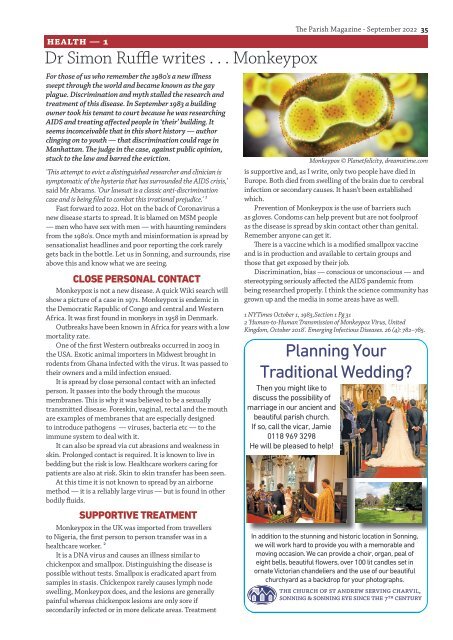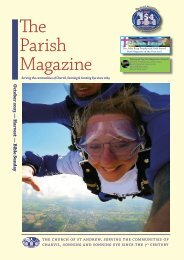The Parish Magazine September 2022
Serving the communities of Charvil, Sonning and Sonning Eye since 1869
Serving the communities of Charvil, Sonning and Sonning Eye since 1869
Create successful ePaper yourself
Turn your PDF publications into a flip-book with our unique Google optimized e-Paper software.
HEALTH — 1<br />
Dr Simon Ruffle writes . . . Monkeypox<br />
For those of us who remember the 1980's a new illness<br />
swept through the world and became known as the gay<br />
plague. Discrimination and myth stalled the research and<br />
treatment of this disease. In <strong>September</strong> 1983 a building<br />
owner took his tenant to court because he was researching<br />
AIDS and treating affected people in ‘their’ building. It<br />
seems inconceivable that in this short history — author<br />
clinging on to youth — that discrimination could rage in<br />
Manhattan. <strong>The</strong> judge in the case, against public opinion,<br />
stuck to the law and barred the eviction.<br />
'This attempt to evict a distinguished researcher and clinician is<br />
symptomatic of the hysteria that has surrounded the AIDS crisis,'<br />
said Mr Abrams. 'Our lawsuit is a classic anti-discrimination<br />
case and is being filed to combat this irrational prejudice.' 1<br />
Fast forward to <strong>2022</strong>. Hot on the back of Coronavirus a<br />
new disease starts to spread. It is blamed on MSM people<br />
— men who have sex with men — with haunting reminders<br />
from the 1980's. Once myth and misinformation is spread by<br />
sensationalist headlines and poor reporting the cork rarely<br />
gets back in the bottle. Let us in Sonning, and surrounds, rise<br />
above this and know what we are seeing.<br />
CLOSE PERSONAL CONTACT<br />
Monkeypox is not a new disease. A quick Wiki search will<br />
show a picture of a case in 1971. Monkeypox is endemic in<br />
the Democratic Republic of Congo and central and Western<br />
Africa. It was first found in monkeys in 1958 in Denmark.<br />
Outbreaks have been known in Africa for years with a low<br />
mortality rate.<br />
One of the first Western outbreaks occurred in 2003 in<br />
the USA. Exotic animal importers in Midwest brought in<br />
rodents from Ghana infected with the virus. It was passed to<br />
their owners and a mild infection ensued.<br />
It is spread by close personal contact with an infected<br />
person. It passes into the body through the mucous<br />
membranes. This is why it was believed to be a sexually<br />
transmitted disease. Foreskin, vaginal, rectal and the mouth<br />
are examples of membranes that are especially designed<br />
to introduce pathogens — viruses, bacteria etc — to the<br />
immune system to deal with it.<br />
It can also be spread via cut abrasions and weakness in<br />
skin. Prolonged contact is required. It is known to live in<br />
bedding but the risk is low. Healthcare workers caring for<br />
patients are also at risk. Skin to skin transfer has been seen.<br />
At this time it is not known to spread by an airborne<br />
method — it is a reliably large virus — but is found in other<br />
bodily fluids.<br />
SUPPORTIVE TREATMENT<br />
Monkeypox in the UK was imported from travellers<br />
to Nigeria, the first person to person transfer was in a<br />
healthcare worker. 2<br />
It is a DNA virus and causes an illness similar to<br />
chickenpox and smallpox. Distinguishing the disease is<br />
possible without tests. Smallpox is eradicated apart from<br />
samples in stasis. Chickenpox rarely causes lymph node<br />
swelling, Monkeypox does, and the lesions are generally<br />
painful whereas chickenpox lesions are only sore if<br />
secondarily infected or in more delicate areas. Treatment<br />
<strong>The</strong> <strong>Parish</strong> <strong>Magazine</strong> - <strong>September</strong> <strong>2022</strong> 35<br />
is supportive and, as I write, only two people have died in<br />
Europe. Both died from swelling of the brain due to cerebral<br />
infection or secondary causes. It hasn’t been established<br />
which.<br />
Prevention of Monkeypox is the use of barriers such<br />
as gloves. Condoms can help prevent but are not foolproof<br />
as the disease is spread by skin contact other than genital.<br />
Remember anyone can get it.<br />
<strong>The</strong>re is a vaccine which is a modified smallpox vaccine<br />
and is in production and available to certain groups and<br />
those that get exposed by their job.<br />
Discrimination, bias — conscious or unconscious — and<br />
stereotyping seriously affected the AIDS pandemic from<br />
being researched properly. I think the science community has<br />
grown up and the media in some areas have as well.<br />
1 NYTimes October 1, 1983,Section 1 Pg 31<br />
2 'Human-to-Human Transmission of Monkeypox Virus, United<br />
Kingdom, October 2018'. Emerging Infectious Diseases. 26 (4): 782–785.<br />
Planning Your<br />
Traditional Wedding?<br />
<strong>The</strong>n you might like to<br />
discuss the possibility of<br />
marriage in our ancient and<br />
beautiful parish church.<br />
If so, call the vicar, Jamie<br />
0118 969 3298<br />
He will be pleased to help!<br />
In addition to the stunning and historic location in Sonning,<br />
we will work hard to provide you with a memorable and<br />
moving occasion. We can provide a choir, organ, peal of<br />
eight bells, beautiful flowers, over 100 lit candles set in<br />
ornate Victorian chandeliers and the use of our beautiful<br />
churchyard as a backdrop for your photographs.<br />
Church of St Andrew<br />
Serving Sonning, Charvil & Sonning Eye<br />
Monkeypox © Planetfelicity, dreamstime.com<br />
the church of st andrew SERVING CHARVIL,<br />
SONNING & sonning eye since the 7 th century


















